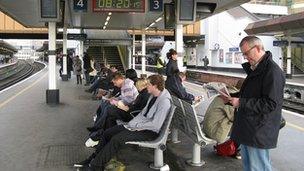Regional rail summit draws up wish list
- Published
- comments

MPs, councillors, business leaders and industry representatives have been looking at plans for rail development
Plans for a "regional manifesto", which lists the priorities for improving rail services in East Anglia, are beginning to take shape.
At the second regional rail summit at Westminster, MPs, councillors, business leaders and industry representatives moved closer to drawing up a wish list of projects which will need to be funded over the next 20 years.
They'll present it to ministers in the summer and perhaps just as importantly, they've all agreed to campaign with one voice to get them achieved.
"The reason nothing has been done for so long in the East is that everyone campaigned for their own individual issues," says Ben Gummer, external, the MP for Ipswich and one of the main organisers of the summit.
"We want everyone across East Anglia to come together and campaign with one voice."
"Here we have representatives from four counties all hopefully agreeing on the same thing," agrees Norwich MP, Chloe Smith, external.
"This is a once-in-a-generation opportunity for a commitment to the long term benefit of the East Anglian, Norfolk and Norwich economies."
Investment issues
There is still more work to be done before the manifesto is ready but the draft prospectus makes a compelling argument.
It maintains that the eastern region has suffered from inadequate investment in infrastructure over many years, while commuters from Essex and Cambridgeshire suffer amongst the greatest congestion of any travellers to London.
Rail passengers, it says, want a more reliable service, faster journey times and better quality rolling stock.
The document quotes a recent study which claims that improving the Great Eastern Mainline - running from Norwich to Liverpool Street - would generate £3.7 billion for the local economy, while investment in other parts of the regional rail network would result in greater investment in the key centres of Ipswich, Colchester, Cambridge, Norwich and Peterborough.
Most people at the summit agreed that speeding up journey times along the intercity line to London was a priority.
Improvement work to the junction at Ely North, which would allow for more services from Kings Lynn and Norwich through Cambridge, is also at the top of the list.
There is a growing feeling that upgrade work on the line from Ipswich to Peterborough would also be beneficial but exactly which projects will be chosen is still being decided.
Getting representatives from four different counties to agree is not always easy.
Colchester MP Sir Bob Russell, external expressed his fear that faster trains from Norwich could mean fewer stops at stations in Essex.
"Remember the population of Essex is greater than that of Norfolk and Suffolk combined," he warned the meeting.
He was assured that there were no plans to reduce services through the county but we understand that several people from Essex are still concerned and will be holding their own meeting to discuss this issue further in the next few weeks.
Local schemes
Other MPs also thought it was important that their local schemes were not forgotten.
Julian Huppert (Cambridge) wanted to mention Chesterton station, Norman Lamb (North Norfolk) talked about the Bittern Line, Therese Coffey (Suffolk Coastal) was worried about whether improvements to the Ipswich Chord would really take enough freight traffic off the passenger line.
Stewart Jackson (Peterborough) said it was important to remember that rail improvements did not just mean getting more people to London.
"We must remember to talk about how rail travel can benefit our local economies: developing telecoms in Ipswich, retail in Norwich and the environmental sector in Peterborough."
Representatives from Network Rail, external reminded everyone present that there would be few quick fixes.
If funding was found to take forward some of these projects it would take time and money to improve rolling stock and improve level crossings (an essential requirement if trains are to go faster).
They also said that until cross rail is operational in 2018 there will not be space at Liverpool Street to take extra trains.
So we are not talking any time soon.
The hope is that the rail manifesto will be completed by the summer so that ministers can be lobbied as they make their minds up about the new rail franchises and future spending commitments.
And all the delegates left happy feeling that things are slowly moving forward.
"There's never been an opportunity like this before," said Jonathan Denby, from rail operator Abellio, external.
"We're passionate about making this happen."
Just don't hold your breath.